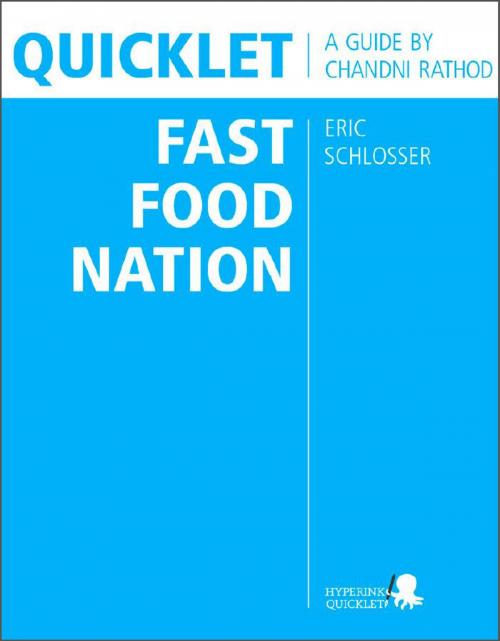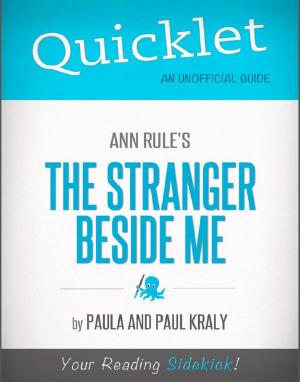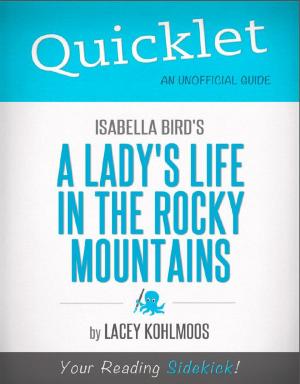Quicklet on Eric Schlosser's Fast Food Nation
Nonfiction, Health & Well Being, Health, Nutrition & Diet, Food Content Guides, Social & Cultural Studies, Social Science| Author: | Chandni Rathod | ISBN: | 9781614646358 |
| Publisher: | Hyperink | Publication: | July 30, 2012 |
| Imprint: | Hyperink | Language: | English |
| Author: | Chandni Rathod |
| ISBN: | 9781614646358 |
| Publisher: | Hyperink |
| Publication: | July 30, 2012 |
| Imprint: | Hyperink |
| Language: | English |
ABOUT THE BOOK
“Hundreds of millions of people buy fast food every day without giving it much thought, unaware of the subtle and not so subtle ramifications of their purchases. They rarely consider where this food came from, how it was made, what it is doing to the community around them. They just grab their tray off the counter, find a table, take a seat, unwrap the paper, and dig in. The whole experience is transitory and soon forgotten. I've written this book out of a belief that people should know what lies behind the shiny, happy surface of every fast food transaction. They should know what really lurks between those sesame-seed buns.”
Published in 2001, Eric Schlosser’s Fast Food Nation: The Dark Side of the All-American Meal explores the dark underbelly of fast food production in the United States. An award-winning journalist and contributor to Atlantic Monthly, Schlosser developed the book from a series of articles for Rolling Stone magazine. Rolling Stone asked Schlosser to find out where fast food came from. As someone who enjoyed indulging in fries and hamburgers, Schlosser was initially reluctant to take on the assignment.
As he began to research the history and formation of the fast food industry, he became increasingly curious about how the industry gained power and influence on America’s agricultural landscape and food culture. With over 50 pages of research notes included at the end of the book, the author defends his points with thorough analysis from various legal investigations, interviews, and journal articles. Schlosser artfully weaves sarcasm with gritty investigative journalism to demonstrate how corporations and greed have corrupted the food system in America.
Schlosser’s book was a New York Times bestseller for over two years and has sold over 1.4 million print copies. In 2006, Fast Food Nation became a fictionalized film directed by Richard Linklater, which was featured at the Cannes Film Festival.
However, the book and film were not met without criticism from trade industry producers of beef, potatoes, and restaurant chains like McDonald's. The Wall Street Journal reported in 2006 that various organizations were trying to create campaigns against Schlosser’s allegations in the book that fast food consumption contributes to obesity and fostered corruption in the nation’s agricultural system.
EXCERPT FROM THE BOOK
The author playfully muses that, should America be attacked in the future, Cheyenne Mountain may be the only place with artifacts of our civilization – “Burger King wrappers, hardened crusts of Cheesy Bread, Barbeque Wings bones, and the red, white, and blue of a Domino’s pizza box.”
What started as a small food stand in southern California has now spread all over the nation. Schlosser says fast food “has infiltrated every nook and cranny of American society.”
Shockingly, Americans spend more today on fast food than higher education, computers, or new cars. Schlosser estimates, “On any given day in the United States about one-quarter of the country’s adult population visits a fast food restaurant.”
The author argues that the powerful rise of fast food industry happened quickly and “not only transformed the American diet, but also out landscape, economy, workforce, and popular culture.”
Importantly, Schlosser draws parallels between Cheyenne Mountain and today’s fast food industry.
ABOUT THE BOOK
“Hundreds of millions of people buy fast food every day without giving it much thought, unaware of the subtle and not so subtle ramifications of their purchases. They rarely consider where this food came from, how it was made, what it is doing to the community around them. They just grab their tray off the counter, find a table, take a seat, unwrap the paper, and dig in. The whole experience is transitory and soon forgotten. I've written this book out of a belief that people should know what lies behind the shiny, happy surface of every fast food transaction. They should know what really lurks between those sesame-seed buns.”
Published in 2001, Eric Schlosser’s Fast Food Nation: The Dark Side of the All-American Meal explores the dark underbelly of fast food production in the United States. An award-winning journalist and contributor to Atlantic Monthly, Schlosser developed the book from a series of articles for Rolling Stone magazine. Rolling Stone asked Schlosser to find out where fast food came from. As someone who enjoyed indulging in fries and hamburgers, Schlosser was initially reluctant to take on the assignment.
As he began to research the history and formation of the fast food industry, he became increasingly curious about how the industry gained power and influence on America’s agricultural landscape and food culture. With over 50 pages of research notes included at the end of the book, the author defends his points with thorough analysis from various legal investigations, interviews, and journal articles. Schlosser artfully weaves sarcasm with gritty investigative journalism to demonstrate how corporations and greed have corrupted the food system in America.
Schlosser’s book was a New York Times bestseller for over two years and has sold over 1.4 million print copies. In 2006, Fast Food Nation became a fictionalized film directed by Richard Linklater, which was featured at the Cannes Film Festival.
However, the book and film were not met without criticism from trade industry producers of beef, potatoes, and restaurant chains like McDonald's. The Wall Street Journal reported in 2006 that various organizations were trying to create campaigns against Schlosser’s allegations in the book that fast food consumption contributes to obesity and fostered corruption in the nation’s agricultural system.
EXCERPT FROM THE BOOK
The author playfully muses that, should America be attacked in the future, Cheyenne Mountain may be the only place with artifacts of our civilization – “Burger King wrappers, hardened crusts of Cheesy Bread, Barbeque Wings bones, and the red, white, and blue of a Domino’s pizza box.”
What started as a small food stand in southern California has now spread all over the nation. Schlosser says fast food “has infiltrated every nook and cranny of American society.”
Shockingly, Americans spend more today on fast food than higher education, computers, or new cars. Schlosser estimates, “On any given day in the United States about one-quarter of the country’s adult population visits a fast food restaurant.”
The author argues that the powerful rise of fast food industry happened quickly and “not only transformed the American diet, but also out landscape, economy, workforce, and popular culture.”
Importantly, Schlosser draws parallels between Cheyenne Mountain and today’s fast food industry.















